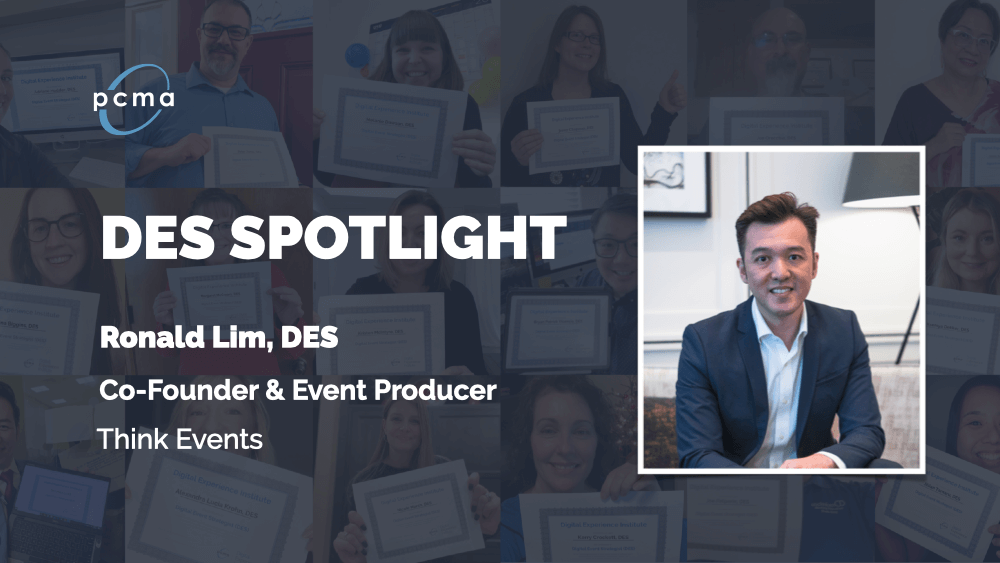Everyone knows that technology is the future—and it’s a future expedited by the pandemic. The virtual space once viewed as a novelty is here to stay, allowing more access to events all around the globe. Ronald Lim, Co-founder & Event Producer, Think Events started this journey of technological discovery back in 2018. That forward-thinking didn’t magically make the pandemic easier; he still needed to navigate the landscape of a digital event. Here is his story.
Tell us a little bit about what you do and what made you pursue DES in the first place.
I am a business event strategist and technologist based in Asia, helping our corporate clients, associations and government agencies such as International Telecommunication Union under the United Nations to produce and execute conferences and events. I have always loved event technologies and that’s why in 2018 I have joined hands with my trusted audio-visual partners to form Creative Rock Group, an audio-visual technology company in Asia.
When the pandemic hit us in 2020, our companies were very blessed to be able to adapt and introduced the right virtual event solutions to our clients based on their needs – we managed to collaborate with Hilton Kuala Lumpur to set up the first virtual studio in a hotel in Malaysia and we conceptualised an online event professionals education platform, Tribe Digital Campus, the first and only one in Malaysia made free for event professionals by the first CVB setup in Malaysia, Business Events Sarawak.
We believe that digital event (whether it’s fully virtual or hybrid) will be here to stay even after everyone has been vaccinated and travel is again made possible. The pandemic has expedited the acceptance and usage of technology, for example we see more events and marketing campaigns using AR/VR/XR technology.
We have used AR for a product launch last year, getting all the 500 attendees involved in the closed-door virtual launch event. This year, we will be executing a 360 virtual tour to launch a distribution facility here in Malaysia. Our clients are becoming more receptive to new ideas and concepts.
By now we have all seen plenty of advantages of digital events, and we have seen successful digital events from ICCA, PCMA and other major conferences all over the world. Organisers have access to well-known speakers from all parts of the world without spending too much on flights and accommodation, more attendees can join the conferences since it’s more cost effective without having to spend on travel and on demand is available for those in different time zone.
In order for us to keep up with the trend and to serve our clients better, it is important for us to equip ourselves with the right education on digital events. Hence, the first step for us is to get certified by a credible organisation such as PCMA.
What key learnings from the DES course have you implemented in the event(s) you’ve worked on / are working on?
Many of us assume that digital event is very straight forward and just shifting what we normally do at a physical event to video format for online viewing. Unfortunately, it is not as simple as that. We don’t wish to broadcast an event digitally and give the attendees the feeling of just watching a television programme. We want them to feel they are a part of the digital event and able to receive knowledge and share their voices.
I appreciate that the DES course outlined the preparation and planning part of a digital event, especially how we can plan the program and content that will fit both physical and virtual attendees in a hybrid scenario, how we should prepare the exhibitors and speakers, and how we can monetise a digital event.
I am working on a few virtual conferences whereby it is the exhibitors’ and speakers’ first time to engage on virtual platforms. DES course has helped me to structure my proposal to the exhibitors and briefing to the speakers, and I am able to suggest ways or tools that can help them to engage better.
Sponsorship is key for most of our clients’ events and DES course has helped me prepare a better sales pitch to the sponsors without undervaluing a digital event. Prior to taking DES, our clients and sponsors have the impression that sponsorship packages for a virtual conference should be cheaper. As a result of DES course, I managed to maintain the price of sponsorship packages for a paediatric haematology and oncology conference happening virtually this year after postponing the physical event originally scheduled for 2020 by introducing tools or ideas to the sponsors to increase their return of investment.
If a friend or colleague is on the fence about taking DES, what would you say to nudge them?
To some people, it may be just the acronyms behind our names, but in any industry, continuous education and learning are very important. It’s always an advantage to equip ourselves with the latest knowledge to serve our clients better. Our role as event professionals is to add value to our clients’ events and we can do it with a credible education program with unbiased content.
I know some of our industry partners are struggling to offer digital event management services, and time is tough for most of us. DES can definitely help to give us that advantage when we pitch digital event to our clients and I strongly encourage my friends in the industry to join our DES community.
I am also grateful that Business Events Sarawak offers the scholarship for industry partners to take up DES. Fellow industry partners can reach out to them to get more details on the scholarship.
——
The Digital Event Strategist Spotlight series features Digital Event Strategists and how they are making impact in their work through digital and hybrid events.
For inquiries about the Digital Event Strategist certification, please complete this form.

